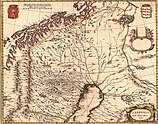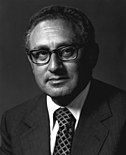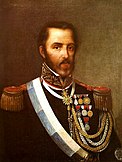Wikipedia:Main Page history/2023 December 1
From today's featured article
Florence Petty (1 December 1870 – 18 November 1948) was a Scottish social worker, cookery writer and broadcaster. During the 1900s she undertook social work in the deprived area of Somers Town in North London, demonstrating for working-class women how to cook inexpensive and nutritious foods. Much of the instruction was done in their homes. She published cookery-related works aimed at those also involved in social work, and a cookery book and pamphlet aimed at the public. From 1914 until the mid-1940s she toured Britain giving lecture-demonstrations of cost-efficient and nutritious ways to cook, including dealing with food shortages during the First World War. In the late 1920s and early 1930s, she was a BBC broadcaster on food and budgeting. Petty worked until she was in her seventies. She is considered to be a pioneer of social work innovations. Her approach to teaching the use of cheap nutritious food was a precursor to the method adopted by the Ministry of Food during the Second World War. (Full article...)
Did you know ...
- ... that Anders Bure created the "first real map" of Sweden (copy pictured)?
- ... that Brother Jonathan by John Neal has been considered the longest work of early American fiction?
- ... that 24-year-old Mahasweta Chakraborty of Operation Ganga helped around 800 students return to India during the Russian invasion of Ukraine?
- ... that a "bat ensnared by a plant" was discovered in the garden of the Palestine Museum of Natural History?
- ... that Ron Monaco, described as the "longest of long shots", became a starter in the NFL having been just a backup in college?
- ... that Herky and Timmy's Racing Coaster is the first roller coaster in South Korea to go backwards?
- ... that Julie Cliff revealed that an outbreak of konzo in Mozambique was caused by cyanide in insufficiently processed cassava?
- ... that a Florida TV station was late to its first broadcast because an engineer overslept?
In the news
- Former U.S. secretary of state Henry Kissinger (pictured) dies at the age of 100.
- All 41 workers trapped in a road tunnel collapse in Uttarakhand, India, are rescued after 17 days underground.
- The novel Prophet Song by Paul Lynch wins the Booker Prize.
- Somalia is admitted as the eighth member of the East African Community.
- The Party for Freedom, led by Geert Wilders, wins the most seats in the Dutch general election.
On this day
December 1: World AIDS Day; Great Union Day in Romania (1918)
- 1828 – Returning to Buenos Aires with troops who fought in the Cisplatine War, Juan Lavalle (pictured) deposed provincial governor Manuel Dorrego, reigniting the Argentine Civil Wars.
- 1918 – With the signing of the Act of Union, Denmark recognized the Kingdom of Iceland as a fully sovereign state in personal union through a common monarch.
- 1923 – The Gleno Dam in the Italian province of Bergamo failed due to poor workmanship, flooding the downstream valley and killing at least 356 people.
- 1971 – A period of political and economic reforms in the Socialist Republic of Croatia came to an end as the League of Communists of Yugoslavia decided to purge the state's reformist leadership.
- 1988 – Five armed men hijacked a bus carrying schoolchildren and a teacher in Ordzhonikidze (now Vladikavkaz, Russia), and were later given an Ilyushin Il-76 aircraft and ransom for the release of the hostages.
- Saint Eligius (d. 660)
- Martin Heinrich Klaproth (b. 1743)
- Marie Tussaud (b. 1761)
- Masao Horiba (b. 1924)
From today's featured list
The first three battlecruisers of the Royal Navy were laid down while the world's first "all big gun" warship, HMS Dreadnought, was being built in 1906. The battlecruiser was the brainchild of Admiral Sir John ("Jacky") Fisher, the man who had sponsored the construction of the Dreadnought. He visualised a new breed of warship with the armament of a battleship, but faster, lighter, and less heavily armoured. This design philosophy was most successful in action when the battlecruisers could use their speed to run down smaller and weaker ships. The best example is the Battle of the Falkland Islands where Invincible and Inflexible sank the German armoured cruisers SMS Scharnhorst and SMS Gneisenau almost without damage to themselves, despite numerous hits by the German ships. They were less successful against heavily armoured ships, as was demonstrated by the loss of Invincible, Indefatigable, and Queen Mary during the Battle of Jutland in 1916. (Full list...)
Today's featured picture
|
The Arecibo Telescope was a 305-meter-diameter (1,000 ft) spherical-reflector radio telescope built into a natural sinkhole at the Arecibo Observatory located near Arecibo, Puerto Rico. A cable-mount steerable receiver and several radar transmitters for emitting signals were mounted 150 meters (492 ft) above the parabolic antenna. Completed in November 1963, the Arecibo Telescope was the world's largest single-aperture telescope for 53 years, until it was surpassed in July 2016 by the Five-hundred-meter Aperture Spherical Telescope (FAST) in Guizhou, China. Following a long period of declining maintenance exacerbated by Hurricane Maria and two earthquakes, the Arecibo Telescope's receiver cables suffered a catastrophic failure that culminated in the collapse of the receiver platform at around 6:55 a.m. AST (10:55 UTC) on December 1, 2020, as captured in this video. The collapse of the receiver structure and cables onto the dish caused extensive additional damage, and ultimately resulted in the decision to demolish the remaining structure in 2022. Video credit: National Science Foundation
Recently featured:
|
Other areas of Wikipedia
- Community portal – The central hub for editors, with resources, links, tasks, and announcements.
- Village pump – Forum for discussions about Wikipedia itself, including policies and technical issues.
- Site news – Sources of news about Wikipedia and the broader Wikimedia movement.
- Teahouse – Ask basic questions about using or editing Wikipedia.
- Help desk – Ask questions about using or editing Wikipedia.
- Reference desk – Ask research questions about encyclopedic topics.
- Content portals – A unique way to navigate the encyclopedia.
Wikipedia's sister projects
Wikipedia is written by volunteer editors and hosted by the Wikimedia Foundation, a non-profit organization that also hosts a range of other volunteer projects:
-
Commons
Free media repository -
MediaWiki
Wiki software development -
Meta-Wiki
Wikimedia project coordination -
Wikibooks
Free textbooks and manuals -
Wikidata
Free knowledge base -
Wikinews
Free-content news -
Wikiquote
Collection of quotations -
Wikisource
Free-content library -
Wikispecies
Directory of species -
Wikiversity
Free learning tools -
Wikivoyage
Free travel guide -
Wiktionary
Dictionary and thesaurus
Wikipedia languages
This Wikipedia is written in English. Many other Wikipedias are available; some of the largest are listed below.
-
1,000,000+ articles
-
250,000+ articles
-
50,000+ articles





